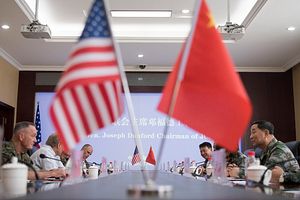The Diplomat recently published a piece by Tuan N. Pham in two parts: “The United States Has Not Lost the South China Sea” and ”How America Can Keep from Losing in the South China Sea.” In part one Pham summarizes recent developments in the South China Sea and “the strategic implications thereof” and then “sets the conditions for further discussion in part two on the ways and means the United States could turn the tide,” “recover the high ground of regional influence, and stave off losing the SCS.” However, his argument is riddled with false premises and wishful thinking.
To begin with, Pham refers to examples of recent views on the status of the U.S. in Southeast Asia ranging from diminished U.S. regional influence to the extreme of the “loss of the South China Sea.” He cites an article by an unnamed scholar affiliated with China’s National Institute for South China Sea Studies as an example of a view that U.S. influence in the region has diminished. I am the unnamed “scholar.”
As such, I am flattered that Pham reads my writings and in this instance seems to agree with my assessment. However, I do object to his citing my work in his building of a foundation for his policy prescriptions. It is quite clear from his and my previous writings that we differ greatly regarding the causes and resolutions of the South China Sea issues. Indeed, based on his false premises, his prescriptions are a mixture of tried and failed policies and unrealistic and misguided thinking.
The real problems begin in part one when Pham regurgitates the standard U.S. government line that Beijing has greatly benefited from the “regional status quo and greater international system.” China may or may not have benefited “greatly” from the U.S. and Western built and led international system. That is a debate for another time and place. Suffice it to say that many Chinese analysts and leaders would not agree with this self-serving assumption. What is clear however is that if China ever did think that way, it certainly does not now — particularly regarding Asia and the South China Sea. Rather China believes that the U.S. is using the existing “international system” to contain and constrain it and its “destiny” to be accepted as an equal, at least in Asia. Naturally — like other rising great powers before it, including America — China wants to bend the international system to further its national interests.
Moreover, Pham suggests that the U.S. has made repeated overtures and even deferred to China’s national interests. Again this would come as a surprise to China’s leaders. Indeed, since China’s President Xi Jinping proposed “a new type of great power relationship” the U.S. has shied away from even discussing it, let alone treating China as an equal — even in its own region.
Pham then demonstrates wishful thinking when he treats the U.S. soft-power setbacks as temporary phenomena and then lists a series of incipient developments as negating this downward trend in U.S. regional influence. He lists as “not permanent,” developments like ”change in Philippines foreign policy”; ”warming relations between Beijing and Bangkok”; “closer Chinese ties with Laos and Cambodia”; “Trans-Pacific Partnership withdrawal”; and “the rise of the Chinese economy to second largest in the world.” Indeed these changes in China’s favor are not permanent — nothing in this context is including the U.S. as the dominant regional or world power — but they are not likely to be reversed anytime soon.
On the other hand, Pham’s list of supposedly U.S.-positive developments like “rising friction between Hanoi and Beijing”; “developing United States-Japan-Australia trilateral alliance”; “Tokyo’s continuing outreach to SEA capitals”; “New Delhi’s making greater inroads into SEA”; and “slowing Chinese economic growth” are a mix of incipient possibilities and hope. As such they are a rather fragile house of cards on which to build a policy prescription.
Nevertheless, Pham proceeds in his part two to prescribe a repetitious laundry list of steps the U.S. should take to keep from “losing in the South China Sea.” Many of his policy prescriptions have already been tried and failed or have been ineffective so far in altering China’s behavior. These include “conveying to Beijing that the SCS is a U.S. national interest”; taking firm positions like “no additional island-building”; “no further militarization”; no “coercion”; support for a “substantive and legally binding Code of Conduct”; and ”permissibility of military activities in the EEZ,”
Some of Pham’s recommended new efforts are already in progress and their outcome is uncertain. These include “strengthen extant alliances and partnerships” as well as look for opportunities to build new ones with Hanoi and New Delhi” and continuance of “the campaign of presence operations and FONOPs.” Perhaps the most ludicrous of Pham’s policy suggestions is “support the emerging TTP-11 (the economic pact the U.S. initiated and then abruptly withdrew from) “because economic integration is the most promising and enduring counter to China’s developing and evolving maritime strategy.” It is China, not the U.S., that is rapidly expanding economic ties in Asia.
Pham comes closest to recognizing reality when he says that “Washington must continue to acknowledge that both countries have competing visions, highlight the flawed thinking of Beijing’s approach and champion its own approach as the better choice.” The U.S. has been doing this for some time without noticeably having “significant [positive] influence in shaping China and the region.” Indeed, all it seems to have accomplished is to force some Southeast Asian countries to hedge or even choose sides and to stimulate China to strengthen its pursuit of what it believes is its “destiny” to dominate the region.
Mark J. Valencia is an Adjunct Visiting Senior Scholar at the National Institute for South China Sea Studies, Haikou, China

































